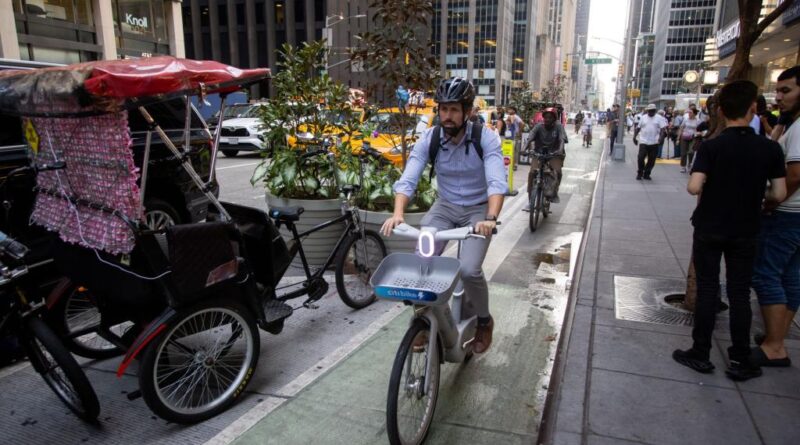Tackle the Chaos Caused by Reckless E-Bikers in NYC

In 2020, the City Council hurried to legalize e-mobility devices such as e-bikes and scooters without waiting for state regulations to be put in place.
The intention was to provide modern transportation alternatives for the busy city streets.
Nearly five years later, we’re witnessing the repercussions of this rapid decision: an alarming rise in injuries, fatalities, and reckless behavior among riders.
Both pedestrians and riders are paying the price for this lack of regulation.
Moreover, these devices have led to a worrying increase in fire incidents linked to lithium-ion batteries.
It’s time for action — a goal that Priscilla’s Law aims to achieve.
The heartbreaking 2023 passing of Priscilla Loke, a beloved advocate from Chinatown, starkly illustrates the necessity of this legislation.
Loke was fatally struck by an e-bike rider who subsequently fled from the accident.
This tragic event is not an anomaly; it represents a growing trend of deadly collisions involving e-mobility devices.
Riders, many under pressure from food-delivery apps, are breaching traffic laws, driving at excessive speeds, and neglecting essential safety measures — often fleeing the scene after accidents.
This reckless conduct endangers lives.
A report by state Assemblyman Alex Bores indicates that e-bike collisions and injuries are occurring at double the rate of traditional bicycles.
Bores also revealed that e-bikes are 19 times deadlier than regular bicycles.
Between 2020 and 2023, New York City recorded 2,254 collisions involving e-bikes, resulting in 2,172 injuries and 22 fatalities.
Additionally, fires linked to unapproved e-bike batteries have surged.
Since 2019, lithium-ion batteries have caused over 730 fires, claiming the lives of 30 New Yorkers and injuring nearly 500.
Despite these escalating threats, Transportation Alternatives (TransAlt), a group that positions itself as an advocate for safer streets, is resisting any regulations that would enhance accountability for riders.
Their stance, allegedly aimed at shielding New Yorkers from a “costly” and “harmful” law, is not only misguided but also hypocritical.
TransAlt has received substantial funding from companies directly invested in maintaining the lack of regulation for these e-mobility devices, including Lyft, Uber, Lime, and DoorDash — all of which profit from the proliferation of e-bikes and scooters.
The organization’s opposition to Priscilla’s Law highlights its preference for corporate interests over the safety and well-being of everyday New Yorkers.
The rationale behind Priscilla’s Law is straightforward: We must hold these riders accountable.
The proposed legislation mandates that all e-mobility devices be registered with the City’s Department of Transportation — a step toward eliminating uncertified batteries — and display a license plate. This simple measure will promote adherence to traffic laws among riders.
We’ve already observed how effective license plates can be in mitigating dangerous behavior.
In the five months since Albany imposed stricter regulations on moped registration, I have seen a notable shift in moped rider conduct, as they are now more compliant with traffic signals due to visible license plates.
The same principle should apply to e-bikes.
Indeed, the city already employs license plates as a means of accountability in other sectors.
The Business Integrity Commission mandates private carters to use an orange license plate, and the Department of Consumer and Worker Protections requires food carts to display license plates.
These systems demonstrate that the city has the capability to implement similar requirements for e-mobility devices — it has been achieved, and it can be replicated.
If a rider runs a red light or collides with a pedestrian while riding on the sidewalk, our street cameras will record the license plate, allowing law enforcement to identify the offender and hold reckless riders accountable for their actions.
The essential point is clear: License plates ensure that individuals who violate traffic laws cannot evade consequences.
However, it isn’t solely about addressing rider accountability; it extends to making companies that rent these devices responsible for their users.
Delivery services like Uber Eats, Grubhub, and others benefiting from the surge in e-mobility vehicles must take the initiative to educate their riders on traffic laws and the inherent risks of using these devices.
Companies need to be held liable for riders who repeatedly breach the rules.
When riders are caught flouting traffic laws, these companies should de-platform them, as they would for any other serious violation.
Priscilla’s Law is a straightforward and effective step toward restoring order to our chaotic streets.
By mandating the registration and licensing of e-mobility devices, we can cultivate a safer environment for all road users — cyclists, drivers, and pedestrians alike.
This legislation is a crucial component in our quest for accountability and safety on our streets.
Let’s see it passed in memory of Priscilla Loke.
Council Member Robert Holden (D) serves District 30 in Queens.



